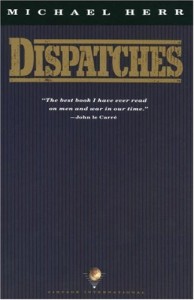 One of the benefits of the study of history is context: you can make sense of your life not only in relation to your immediate circumstances but to the experiences of those that came before you. My grandfather, for example, was born in the 19th century and fought in the First World War, as my uncles would later fight in World War II, and so both these catastrophic events have taken on a special significance for me, as no doubt they have for many generations of young boys and men. And though, being Canadian, no one in my family fought in Vietnam, that bloody conflict still looms large in my imagination. I often think about the injustice of the draft, the terrible choice between desertion and combat foisted on so many young men, and about how irrevocably my life would be altered by such a calamity. I wonder how I would acquit myself, if I would be capable of killing or even keeping my wits about me, and almost as soon as I have posed the question I realize how nothing in my life could or likely ever will provide any context for an answer. By the sheerest accident of history and geography, I have escaped an experience that generations of men before me have contended with and continue to contend with today, all over the world.
One of the benefits of the study of history is context: you can make sense of your life not only in relation to your immediate circumstances but to the experiences of those that came before you. My grandfather, for example, was born in the 19th century and fought in the First World War, as my uncles would later fight in World War II, and so both these catastrophic events have taken on a special significance for me, as no doubt they have for many generations of young boys and men. And though, being Canadian, no one in my family fought in Vietnam, that bloody conflict still looms large in my imagination. I often think about the injustice of the draft, the terrible choice between desertion and combat foisted on so many young men, and about how irrevocably my life would be altered by such a calamity. I wonder how I would acquit myself, if I would be capable of killing or even keeping my wits about me, and almost as soon as I have posed the question I realize how nothing in my life could or likely ever will provide any context for an answer. By the sheerest accident of history and geography, I have escaped an experience that generations of men before me have contended with and continue to contend with today, all over the world.
Before I had heard of Michael Herr or Dispatches, a collection of his writings for Esquire magazine in his capacity as a volunteer (volunteer!) war correspondent, he had helped to provide some of my most indelible images of the Vietnam War as a screenwriter for films like Apocalypse Now and Full Metal Jacket. But Dispatches is personal, a record of his seventeen months “in the shit,” and unlike so much war reporting, it has no more design on the reader than to tell the truth. But the truth Herr wants to tell can’t adequately be conveyed by dates and figures, by the always obscene act of tallying dead and wounded.
Conventional journalism could no more reveal this war than conventional firepower could win it, all it could do was take the most profound event of the American decade and turn it into a communications pudding, taking its most obvious, undeniable history and making it into a secret history.
So Herr ditches conventional journalism and presents his story, and the story of the men he encounters (“War stories aren’t anything more than stories about people anyway”), in vivid detail and frenetic prose. Here, for example, are his descriptions of those infamous jungles:
The Puritan belief that Satan dwelt in Nature could have been born here, where even on the coldest, freshest mountaintops you could smell jungle and that tension between rot and genesis that all jungles give off.
And:
Oh, that terrain! The bloody, maddening uncanniness of it! When the hideous Battle of Dak To ended at the top of Hill 875, we announced that 4,000 of them had been killed; it had been the purest slaughter, our losses were bad, but clearly it was another American victory. But when the top of the hill was reached, the number of NVA found was four.
The result can only be called “literary,” an odd assemblage of anecdotes, characters and horrors that collectively convey something of the war’s terror and appeal.
I say “appeal” because Herr says “appeal,” because however much you lament the failure of diplomacy or the flagrant disregard for human life, the sheer wastefulness of the whole affair, you also have to contend with the fact that life is never so meaningful or poignant as when even a simple trip to the bathroom entails the possibility of death. It’s one of war’s many contradictions, one most are too piously devoted to their lamentations to admit. “Maybe you couldn’t love the war and hate it inside the same instant, but sometimes those feelings alternated so rapidly that they spun together in a strobic wheel rolling all the way up until you were literally High On War, like it said on all the helmet covers.”
In Dispatches, Herr forces us to confront these contradictions, forces us to see war’s horror and its sick appeal, and to partake, if only vicariously, in its cruel logic. More than the jungle hell he evokes or the images of bodybags and twisted flesh he conjures, his psychological probings devastate.